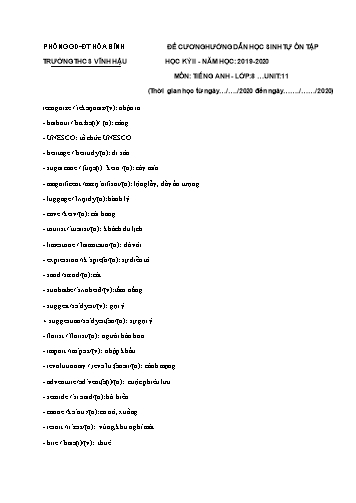Đề cương ôn tập môn Tiếng Anh Lớp 8 - Học kì II - Unit 11 - Năm học 2019-2020 - Nguyễn Thị Liệu
Bạn đang xem tài liệu "Đề cương ôn tập môn Tiếng Anh Lớp 8 - Học kì II - Unit 11 - Năm học 2019-2020 - Nguyễn Thị Liệu", để tải tài liệu gốc về máy hãy click vào nút Download ở trên.
Tóm tắt nội dung tài liệu: Đề cương ôn tập môn Tiếng Anh Lớp 8 - Học kì II - Unit 11 - Năm học 2019-2020 - Nguyễn Thị Liệu

- oceanic /ˌəʊʃiˈỉnɪk/(a): thuộc về đại dương - rescue /ˈreskjuː/(v): cứu hộ - institute /ˈɪnstɪtjuːt/(n): học viện, viện nghiên cứu - giant /ˈdʒaɪənt/(a): to lớn, khổng lồ - buddha /ˈbʊdə/(n): phật - lean/liːn/(v): nghiêng đi, dựa, tựa - offshore /ˌɒfˈʃɔː(r)/(n): ngồi khơi - overturn/ˌəʊvəˈtɜːn/ (v): lật đổ, lật úp - island /ˈaɪlənd/(n): hịn đảo - accommodation /əˌkɒməˈdeɪʃn/(n): chỗ ở - stumble /ˈstʌmbl/(v): vấp, ngã - realize /ˈriːəlaɪz/(v): nhận ra - make in (v): sản xuất tại - eternal /ɪˈtɜːnl/(n): vĩnh cửu - keep in (v): giữ - wrap in (v): gĩi, bọc, quấn - tribe /traɪb/(n): bộ tộc, bộ lạc - cigarette /ˌsɪɡəˈret/(n): thuốc lá - slope /sləʊp/(n): sườn, dốc - jungle stream /ˈdʒʌŋɡl - striːm/(n): suối trong rừng Past participle and present participle The form of a verb used in compound tenses and as an adjective. English uses the present participle, which ends in ‘-ing’, and the past participle, which usually ends in ‘- ed’. o We use the present participle to modify and clear meaning of nouns in front of it. Subject can cause the action of verb. For example. The boy reading a book is Ba. - Would you mind if I closed the window? + No, that would be fine. - Would you mind if I used your phone? + No. of course not. - Do you mind if I used your motorbike? - I'd rather you didn’t. * Khi yêu cầu/ đề nghị ai làm điều gì một cách lịch sự, chúng ta dùng cấu trúc: Do/ Would you mind + V-ing...? (Bạn làm ơn (làm) giúp tơi (điều gì) được khơng?) Ngồi cách đáp lại như đã nêu trên, chúng ta cĩ thể dùng một số cách nĩi sau đây: - No. I'd be happy to do. - Not at all. I’d be glad to. (Khơng cĩ gì. Tơi lấy làm sung sướng/ vui khi được giúp bạn.) Ví dụ: + I want to visit the Imperial Citadel. Would you mind showing me the way to get there? - No. I'd be happy to do. Test for unit 11 I. Use ‘Would/ Do you mind + verb-ing?’ to make these requests more polite. EX: Can you take me a photograph? - Would/ Do you mind taking me a photograph? Could you wait a moment, please? Will you turn down the TV, please? Please make some tea. Could you lend me some money? Will you post the letters for me? Could you open the windows? II. Use ‘Would/ Do you mind if ?’ to make the following sentences more polite. 1. Can I move the refrigerator to the right corner? Would/ Do you mind if I moved/move the refrigerator to the right corner? 2. Could I smoke? Do .................................................................... 3. May I ask you a question? Would ............................................. 12.“Romeo and Juliet” is the best tragedy I have ever seen. It was written by Shakespeare. Hết Vĩnh Hậu, ngày.tháng 3 năm 2020 Người soạn Tổ trưởng HIỆU TRƯỞNG Nguyễn Thị Liệu Nguyễn Thị Liệu
File đính kèm:
 de_cuong_on_tap_mon_tieng_anh_lop_8_hoc_ki_ii_unit_11_nam_ho.doc
de_cuong_on_tap_mon_tieng_anh_lop_8_hoc_ki_ii_unit_11_nam_ho.doc